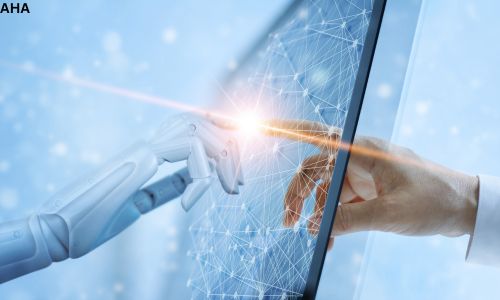Artificial intelligence (AI) is rapidly transforming our world, impacting society in numerous ways. Here’s a breakdown of some of the most significant influences, encompassing both the positive potential and the challenges that AI presents:
Positive Impacts:
- Efficiency and Automation: AI excels at automating repetitive tasks, freeing up human workers to focus on more creative and strategic endeavors. This can streamline processes across industries, from manufacturing and logistics to healthcare and customer service.
- Enhanced Decision-Making: AI algorithms can analyze vast amounts of data to identify patterns and trends that might escape human perception. This can empower better decision-making in areas like finance, risk management, and scientific research.
- Personalized Experiences: AI algorithms personalize user experiences across various platforms, from suggesting products you might like online to recommending movies or music tailored to your tastes.
- Advancements in Healthcare: AI is playing a crucial role in medical diagnosis, drug discovery, and personalized treatment plans. AI-powered tools can analyze medical images for early disease detection and assist in developing new medications through virtual simulations.
- Improved Public Safety: AI can be utilized in facial recognition and anomaly detection for security purposes. However, ethical considerations regarding privacy and bias need to be addressed.
Challenges and Considerations:
- Job displacement: Automation through AI has the potential to displace certain jobs, particularly those involving repetitive tasks. Focus will shift towards retraining and reskilling the workforce for jobs that require human skills like creativity, critical thinking, and problem-solving.
- Algorithmic Bias: AI algorithms can perpetuate existing societal biases if trained on biased data. Mitigating bias in AI development and deployment is crucial for ensuring fairness and ethical use of this technology.
- Privacy Concerns: The vast amount of data collection and analysis by AI systems raises privacy concerns. Regulations and best practices need to be established to safeguard personal information and prevent misuse.
- The Explainability Challenge: Understanding how complex AI algorithms arrive at their decisions can be challenging. This lack of transparency can raise concerns about accountability and fairness, particularly in sensitive applications.
- The Future of Work: As AI continues to evolve, the nature of work itself is likely to transform. Adapting education systems and social safety nets will be crucial to navigate this changing landscape.
The Road Ahead:
The impact of AI on society is profound and multifaceted. While AI offers immense potential for progress and innovation, addressing the challenges and ensuring responsible development will be paramount. Open discussions, collaboration between stakeholders, and ethical considerations are essential for harnessing the power of AI for the greater good.



